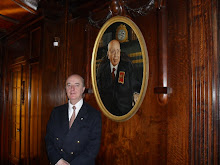22 de septiembre de 2015
The case for retiring another ‘barbarous relic’ - Could a world without cash make for a much-improved economy?
ft.com > comment >
Could a world without cash make for a much-improved economy?
T
he fact that people treat cash as the go-to safe asset when banks are teetering is heavy with historical irony. Paper money was once the symbol of monetary irresponsibility. But even as individuals have taken recent crises as reasons to stock up on banknotes, authorities would do well to consider the arguments for phasing out their use as another “barbarous relic”, the moniker Keynes gave to gold.
Already, by far the largest amount of money exists and is transacted in electronic form — as bank deposits and central bank reserves. But even a little physical currency can cause a lot of distortion to the economic system.
The existence of cash — a bearer instrument with a zero interest rate — limits central banks’ ability to stimulate a depressed economy. The worry is that people will change their deposits for cash if a central bank moves rates into negative territory. The Swiss, Danish and Swedish central banks have pushed rates lower than many thought possible; but most policymakers still believe in an “effective” lower band not far below zero.
With a recovery under way in most rich countries this may seem academic. The talk is now of when to raise rates. But the fear of the lower band is still causing damage. The dominant argument for beginning the tightening cycle is to have enough “ammunition” for a new stimulus when the next downturn comes. Removing the lower band would leave central banks well equipped to deal with a slowdown even from near-zero starting points.
The second feature of cash is that, unlike electronic money, it cannot be tracked. That means cash favours anonymous and often illicit activity; its abolition would make life easier for a government set on squeezing the informal economy out of existence.
It is in this spirit that Kenneth Rogoff, the former chief economist of the International Monetary Fund, hasargued in these pages for abolishing high-denomination banknotes such as the €100 and €500 notes.
Electronic money also permits innovations to reward law-abiding businesses. Value added tax, for example, could be automatically levied — and reimbursed — in real time on transactions between liable bank accounts. Countries that struggle with tax collection could go a long way in solving their problems by restricting the use of cash. Greece, in particular, could make lemonade out of lemons, using the current capital controls to push the country’s cash culture into new habits.
The technological and practical obstacles for using cash have largely disappeared. In Scandinavian countries, cards are regularly used even for tiny transactions. Sweden reached “peak cash” almost a decade ago: the amount of currency in circulation has shrunk by more than a quarter since 2007, even though the population and economy are both larger.
The anonymity that cash uniquely affords is, however, an argument for keeping it as well as for abolishing it. It is not only criminals and money launderers who prefer cash. Especially in the post-Snowden era, many ordinary citizens legitimately want the option of not leaving digital footprints.
Fortunately some benefits of electronic money can be reaped without banning all cash outright. Cash could remain accessible but at a cost, so that its users pay for the privilege of anonymity — and remain affected by monetary policy. Dated banknotes could see their value as legal tender gradually fall over time; banks could be charged for swapping electronic reserves for physical cash and vice versa. The benefits of cash are significant — but they need not be offered for free.
Suscribirse a:
Enviar comentarios (Atom)




No hay comentarios:
Publicar un comentario